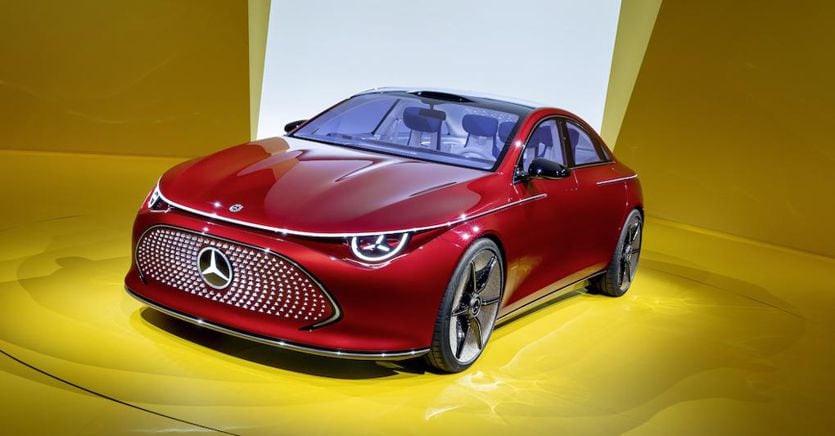Listen to the audio version of the article
Mercedes postpones the switch from endothermic to electric. In summary, here is what Mercedes CEO Ola Källenius recently announced. A statement that doesn’t make the electric car go backwards, but rather makes the one that has piston engines inside the bonnet take a leap forward. In fact, the German company has updated the road map with which it was supposed to say goodbye to Ice engines in 2030, i.e. combustion or if you prefer endothermic, announcing not only the updating of current engines to comply with future anti-pollution regulations, including those that will come into force in the USA in 2027, but also the arrival within that period of a new efficient 2-litre four-cylinder petrol engine and the updating of current multi-energy architectures for future non-zero emission models.
Mercedes, a double road map for the next few years
In practice, Mercedes launches a double road map which sees, on the one hand, the BEV Strategic Consistency for the development of a new generation of electric propulsion models based on the MMA platform starting next year and, on the other hand, the Ice Tactical Flexibility for combustion units. The springs that push Mercedes to this revision are constituted, as for other manufacturers, by the fact that the switch in sales between cars with combustion engines and electric ones, at the moment, concerns only Europe and California at a regulatory level, since weight of development and production costs, the need to convincingly increase the autonomy and diffusion of fast charging stations, the costs of charging and batteries, in this case because the availability of the components for their creation is monopolized by China . Ultimately, the electricity transition is not a global issue and will only happen where it is possible when conditions allow it. It is surprising that even Mercedes ended up in this group, considering that its main shareholder is the Chinese Geely. However, not even so covertly, even Geely which has many brands launched in pure electrification, for example Volvo which for the moment does not announce any revision to its intention to no longer produce cars with Ice engines from 2030, is still playing on the internal combustion engine front highly efficient to support hybrid and plug-in hybrid systems, the diffusion of which is considered relevant for a long time to come. In this regard, just think of the agreement with the Renault Nissan Alliance to create a giant in the production of Ice units, which could also include Aramco, a Saudi company in the hydrocarbon sector, which should concentrate on the research of e-fuel and hydrogen for power combustion engines.
Mercedes, other automotive groups are also slowing down the electric race
As anticipated, Mercedes’ change of vision is not an isolated case. In fact, for example, BMW, Ford, General Motors, Stellantis and Toyota are on the same wavelength. BMW confirms this both with the Neue Klasse, the multi-energy architecture that will support new models from 2025, and with the growing range of cars from the M sports brand for which electrification stops at plug-in hybrid systems. Ford has revised its strategy by postponing and partly cutting the investment of billions of dollars in electric cars, justifying it with the need to wait for better times for the costs and capacity of the batteries after a significant loss accumulated by full-electric vehicles, in part compensated by the business of corporate fleets and cars with internal combustion engines and to concentrate on hybrid ones. General Motors recently said it was slowing down the development of new models and put the construction of a plant to produce batteries on hold. Stellantis, anticipating the arrival of a family of models derived from the next generation of the Fiat Panda, has announced that they will also be powered by combustion engines to support their diffusion in those parts of the world where there are no conditions for selling electric cars and, therefore, it is not far-fetched to assume that this will also be the case for the other brands of the group, while Toyota continues to rethink its electric strategy despite the road map which includes many full-electric models. The Volkswagen group does not escape this picture and, like the others, finds it difficult to produce electric models on a large scale and profitably, so much so that after having shared its Meb architecture for compact and medium sized models with Ford, an agreement which allows the German group to partially recover the development costs and to Ford not to make investments to create a native electric platform, now it seems that it is talking with Renault to share the small one that the French company is preparing for the future generation of the Twingo E- Tech Electric.
